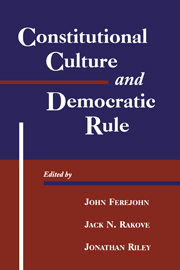Book contents
- Frontmatter
- Contents
- List of Contributors
- Editors' Introduction
- PART ONE CONSTITUTIONAL BEGINNINGS AND TRANSITIONS
- PART TWO CONSTITUTIONAL STRUCTURE AND DESIGN
- PART THREE CONSTITUTIONAL CHANGE AND STABILITY
- 8 Designing an Amendment Process
- 9 Constitutional Theory Transformed
- 10 Constitutional Economic Transition
- 11 Institutionalizing Constitutional Interpretation
- Name Index
- Subject Index
10 - Constitutional Economic Transition
Published online by Cambridge University Press: 20 March 2010
- Frontmatter
- Contents
- List of Contributors
- Editors' Introduction
- PART ONE CONSTITUTIONAL BEGINNINGS AND TRANSITIONS
- PART TWO CONSTITUTIONAL STRUCTURE AND DESIGN
- PART THREE CONSTITUTIONAL CHANGE AND STABILITY
- 8 Designing an Amendment Process
- 9 Constitutional Theory Transformed
- 10 Constitutional Economic Transition
- 11 Institutionalizing Constitutional Interpretation
- Name Index
- Subject Index
Summary
A constitution is not intended to embody a particular economic theory, whether of paternalism and the organic relation of the citizen to the State or of laissez faire
Justice Holmes, dissent in Lochner v. New YorkA NEUTRAL CONSTITUTION
In his short but sharp dissent in Lochner v. New York, 198 U.S. 45 (1904), Justice Oliver Wendell Holmes declared that a constitution is neutral on economic policy. He was wrong in general because some constitutions have gone very far toward embodying particular economic theories. Even the U.S. Constitution embodies a limited degree of laissez-faire, enough to give capitalism at least an advantage over any other economic organization of the society, if Adam Smith's theory is roughly right. What capitalism mainly needed was free markets, and the U.S. Constitution went very far toward providing that markets would not be trammeled by the states acting for narrow interests against farmers and producers in other states.
Holmes was right, however, in the sense that the Constitution of 1787 would allow various economic theories to prevail. One of three systems of economic organization favored by different groups was plantation agrarianism. Although not constitutionally bound to fail, plantation agrarianism failed economically on its own in the face of overpowering capitalism. But the framers of the Constitution did not intentionally put capitalism into the Constitution. They merely designed an economically almost neutral – at least neutral between plantation agrarianism and capitalism – national government, which was virtually all that capitalism needed. And they arguably did even that without much understanding.
- Type
- Chapter
- Information
- Constitutional Culture and Democratic Rule , pp. 328 - 360Publisher: Cambridge University PressPrint publication year: 2001



